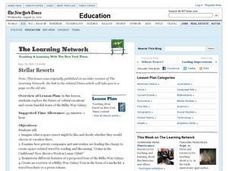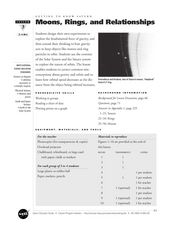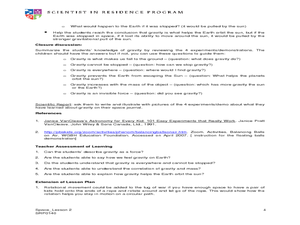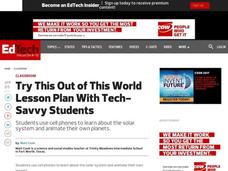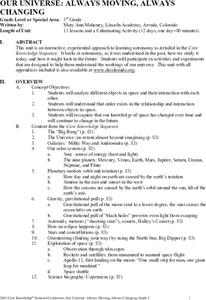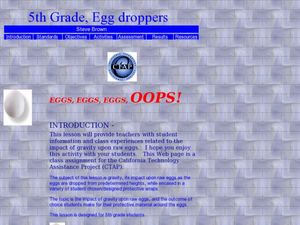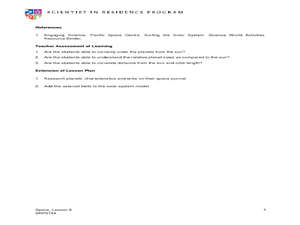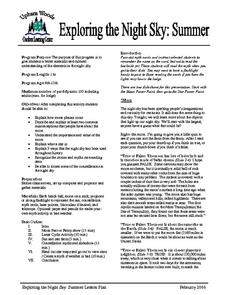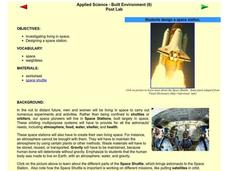Curated OER
Stellar Resorts
Students explore the future of "orbital vacations" and create fanciful tours of the Milky Way Galaxy. Students respond to the following prompt in their journals "Entrepreneurs are currently designing concepts for accommodating tourists...
Curated OER
Getting to Know Saturn: Moons, Rings, and Relationships
Students identify the different objects that orbit Saturn. In this space science lesson, students plot the graph of orbital speed and distance. They explain why planets and asteroids remain in orbit around the sun.
Curated OER
Gravity - The Glue of the Universe
Learners explore physics by conducting a class experiment. In this gravitational force lesson plan, students define several scientific terms associated with force. Learners utilize a styrofoam cup and marbles to simulate a satellite...
Curated OER
Modeling the Solar System
Young scholars build a scaled model of the solar system. In this space science instructional activity, students arrange them according to their distances from the sun. They analyze each planet's unique features such as density and...
Curated OER
The Solar System
Students describe the different bodies that make up our solar system, explain the place of our solar system within the Milky Way Galaxy and the universe, explain day and night and the Earth's movement, and describe the relationship...
Curated OER
Out of This World
Fifth graders animate their own planets. In this solar system lesson, 5th graders use smartphones and the software, GoKnow Sketchy, to create images for presentations on their created planets that appear to be animated when played...
Curated OER
Our Universe: Always Moving, Always Changing
Students explore the main concepts of astronomy through the eleven lessons of this unit. The past, present, and future methods of studying the science are examined in this unit.
Curated OER
Suited for Space
A fantastic lesson on survival in outer space should excite your learners! Pupils explore the challenges that living, working, and surviving in space elicit. They focus on the spacesuit itself; how it protects astronauts, and enables...
Curated OER
5th Grade, Egg Droppers
The classic "Egg Drop Activity" is described in this fine science lesson plan. Young scientists work together to design a container that will protect the eggs inside of it when dropped from a high place. Lots of good scientific...
Curated OER
WebQuest Solar System Colonization Project 2000
Sixth graders investigate the livability of different planets in the universe by researching and organizing information from a number of sources in this unit project. They decide on a location for a space station which they support in an...
Curated OER
Space: Our Star, the Sun, and Its Friends, the Planets
Young scholars examine the solar system. In this space lesson, students identify the order of the planets and their relative size to the sun. Young scholars create a scale model of our solar system using a variety of household objects.
Curated OER
Solar System and Planets
Students identify the main components of the solar system. In this earth science lesson, students order the planets according to their distances from the Sun. They differentiate planets from dwarf planets.
Curated OER
Exploring the Night Sky: Summer
Students explain how moon phases occur. They describe and explain at least two common misconceptions that people have about the moon. Students explain what a star is. They explain 3 ways that the night sky has been used throughout history.
Curated OER
Design a Space Station
Sixth graders investigate living in space. In this science lesson, 6th graders discuss what it is like to live in space and create their own space station or space city of the future.
Curated OER
The Moon
Students design and build an ideal lunar settlement. In this astronomy lesson, students identify the key features of the moon. They compare its environmental condition with the Earth's.
Curated OER
People and Space
Students eat dehydrated foods that the astronauts would eat in space. In this dehydrated foods lesson plan, students make lists of food they could eat, discuss how dehydration takes place, eat food, and complete discussion questions.
